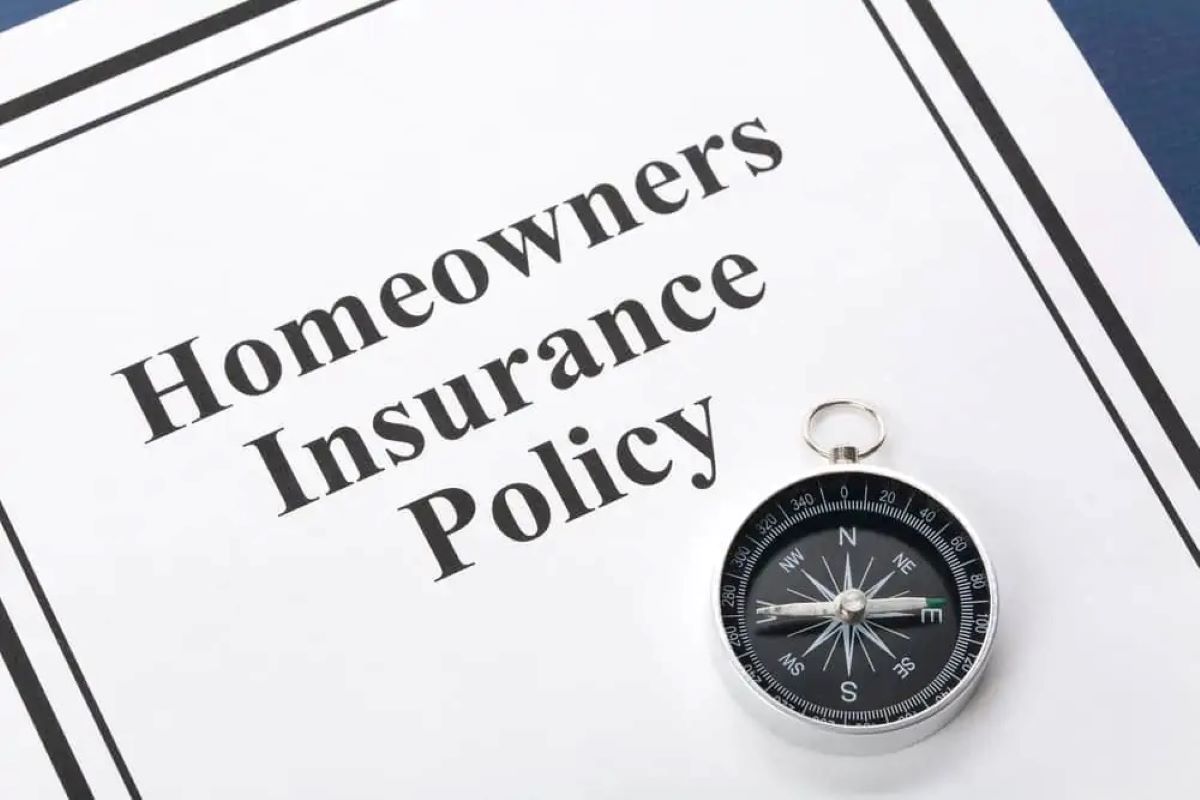

Finance
Why Would You Be Refused Home Insurance
Published: November 23, 2023
Looking for home insurance but keep getting refused? Discover the reasons why and find out how to improve your financial standing to increase your chances of approval.
(Many of the links in this article redirect to a specific reviewed product. Your purchase of these products through affiliate links helps to generate commission for LiveWell, at no extra cost. Learn more)
Table of Contents
- Introduction
- Lack of Financial Stability
- Poor Insurance History
- High-Risk Property Features
- Previous Claims or Losses
- Non-Compliance with Safety Standards
- Inadequate Property Maintenance
- Lack of Personal Liability Coverage
- Insurance Fraud or Misrepresentation
- Credit Score and Debt-to-Income Ratio
- Location and Environmental Factors
- Conclusion
Introduction
When it comes to protecting your most valuable asset, home insurance plays a critical role. It provides financial security and peace of mind in the event of unforeseen circumstances such as a fire, natural disasters, or theft. However, it is important to note that not all homeowners are automatically eligible for home insurance coverage. In certain cases, individuals may be refused home insurance due to various factors.
In this article, we will explore the reasons why you might be refused home insurance and shed some light on the important considerations insurance companies take into account before providing coverage. Understanding these factors can help you navigate the home insurance process and improve your chances of securing the coverage you need.
It is essential to recognize that insurance companies evaluate risks based on several factors, including your financial stability, insurance history, property features, compliance with safety standards, property maintenance, personal liability coverage, credit score, and location. By taking these factors into account, insurers assess the likelihood of having to pay out a claim and determine the appropriate coverage and premium for homeowners.
While being refused home insurance can be disheartening, it is not the end of the road. By addressing the issues that led to the refusal and working on improving those areas, you can increase your chances of obtaining home insurance coverage.
Let’s dive deeper into the specific factors that could lead to being refused home insurance.
Lack of Financial Stability
One of the key factors that insurance companies consider when determining whether to provide home insurance coverage is the applicant’s financial stability. Insurers want to ensure that homeowners have the means to pay their premiums and cover deductibles in the event of a claim. Therefore, if you have a history of financial instability, it may result in a refusal of home insurance.
Insurers typically analyze your credit score and debt-to-income ratio to assess your financial stability. A low credit score or a significant amount of debt may indicate a higher risk of missed payments or financial hardship, which can lead to increased insurance claims. Additionally, if you have a history of bankruptcy or foreclosure, insurance companies may view you as a higher risk and refuse coverage.
To improve your chances of being approved for home insurance, focus on improving your financial stability. Pay your bills on time, reduce your debt, and monitor your credit score regularly. Demonstrating responsible financial habits can enhance your credibility in the eyes of insurance companies and increase your chances of securing coverage.
If you have recently experienced financial difficulties and are unable to obtain home insurance due to this factor, consider working with an insurance specialist who can help connect you with insurers that specialize in serving individuals with financial challenges.
Additionally, it is crucial to note that your financial stability does not solely rely on your credit score. Providing documentation such as proof of income, savings, and investment portfolios can showcase your financial stability and may help insurance companies make a more informed decision regarding your coverage.
Remember, maintaining financial stability not only improves your chances of getting home insurance but also contributes to your overall financial well-being. By managing your finances responsibly, you can protect your home and be prepared for any unexpected events that may arise.
Poor Insurance History
Insurance companies evaluate your past insurance history to assess the level of risk you may pose as a homeowner. If you have a track record of multiple insurance claims, policy cancellations, or non-payment of premiums, it can lead to a refusal of home insurance coverage.
Insurance companies use a database called the Comprehensive Loss Underwriting Exchange (CLUE) to track an individual’s insurance claims history. This database allows insurers to review your claims history and assess the likelihood of future claims.
If you have a history of frequent claims or large payouts, insurance companies may view you as a higher risk and may be hesitant to provide coverage. This is because multiple insurance claims suggest a higher likelihood of future claims and can result in increased costs for the insurance company.
Similarly, if you have a record of policy cancellations or non-payment of premiums, it raises concerns about your reliability as a policyholder. Insurance companies want to ensure that you will fulfill your financial obligations and maintain continuous coverage to protect their interests.
To improve your chances of obtaining home insurance, it is important to maintain a good insurance history. This includes avoiding unnecessary claims, paying premiums on time, and communicating with your insurer to address any issues or concerns. By demonstrating responsible insurance habits, you can rebuild your insurance history and increase your chances of obtaining coverage.
If you have been refused home insurance due to a poor insurance history, consider reaching out to an insurance broker who can provide guidance and connect you with insurers who may be more lenient or specialized in dealing with individuals with a less-than-ideal insurance history.
Remember, insurance companies look for individuals who demonstrate responsible behavior and minimize the likelihood of future claims. By understanding the impact of your insurance history, you can take proactive steps to improve your eligibility for home insurance coverage.
High-Risk Property Features
Insurance companies carefully evaluate the characteristics and features of your property to determine the level of risk involved. Certain property features can increase the likelihood of accidents, damage, or claims, leading to a refusal of home insurance coverage.
Examples of high-risk property features include outdated electrical systems, aging roofs, or faulty plumbing. These elements can pose a higher risk of fire, water damage, or other incidents. Additionally, properties located in areas prone to natural disasters, such as flood zones or earthquake-prone regions, may also be deemed high risk.
Insurance companies typically conduct inspections or request information about a property’s features before providing coverage. If the inspection reveals significant risks or hazards that cannot be easily mitigated, they may refuse to insure the property.
However, it is important to note that not all high-risk property features automatically result in a refusal of coverage. In many cases, insurance companies may require specific improvements or upgrades to mitigate the risks associated with those features. For example, installing a monitored alarm system, upgrading electrical wiring, or reinforcing the property against natural disasters may increase your chances of obtaining home insurance coverage.
If your property has high-risk features, it is advisable to take proactive measures to address those issues and make necessary improvements. In some cases, specialized insurance providers may be willing to offer coverage for high-risk properties, although the premiums may be higher.
Consulting with a professional risk assessment specialist or an insurance broker can provide valuable insight into the steps you can take to mitigate risks and improve your chances of securing home insurance coverage.
Remember, insurance companies prioritize safety and risk reduction. By addressing high-risk property features and taking necessary precautions, you can make your property more insurable and provide a safer environment for you and your family.
Previous Claims or Losses
Insurance companies take into consideration the history of claims or losses associated with a property when determining whether to provide home insurance coverage. If a property has a significant record of previous claims or losses, it can lead to a refusal of coverage.
Insurance companies review the claims history of a property to understand the frequency and severity of past issues. Properties with a history of frequent claims or high-value claims pose a higher risk to insurers. This is because a history of claims suggests a likelihood of future claims, which can result in increased costs for the insurance company.
Additionally, if a property has experienced significant losses in the past, such as extensive fire damage or water damage, insurers may consider it too risky to provide coverage. Properties with a history of losses may indicate underlying issues that increase the likelihood of future incidents.
While a property’s claims history can impact your ability to obtain home insurance coverage, it is important to note that not all claims or losses automatically result in a refusal. Insurance companies may consider the circumstances surrounding the previous claims and assess whether measures have been taken to mitigate the risks associated with those incidents.
If you have experienced previous claims or losses on your property, it is crucial to provide detailed documentation and evidence of the steps taken to address the issues and minimize the potential for future incidents. This can include proof of repairs, upgrades to safety features, or documentation of changes in property usage to reduce risks.
Consulting with an insurance broker who specializes in high-risk properties or has experience in dealing with previous claims can be beneficial. They can provide guidance on how to present your property in the best possible light to insurance companies and increase your chances of securing coverage.
Remember, insurance companies prioritize properties with a lower likelihood of future claims or losses. By taking proactive measures to mitigate risks and providing evidence of improvements, you can improve your eligibility for home insurance coverage, even if you have a history of previous claims or losses.
Non-Compliance with Safety Standards
Ensuring the safety of your property is of utmost importance to insurance companies when assessing eligibility for home insurance coverage. Non-compliance with safety standards can increase the risk of accidents, injuries, and claims, which may result in a refusal of coverage.
Insurance companies typically have specific safety standards that properties must meet to qualify for coverage. This may include requirements for fire safety, security systems, and other protective measures. If your property does not meet these standards or is found to be in violation of safety regulations, insurance companies may refuse to provide coverage.
Common examples of safety standards include having functioning smoke detectors, fire extinguishers, and burglar alarms. Insurers may also consider the condition of staircases, handrails, and electrical systems. Additionally, homes located in areas prone to specific risks, such as coastal regions susceptible to hurricanes, may have additional safety requirements.
If your property does not comply with safety standards, it is crucial to take necessary steps to address the issues. This may involve making repairs, installing safety equipment, or upgrading certain features to meet the requirements set by insurance companies. By demonstrating a commitment to safety and compliance, you can improve your chances of obtaining home insurance coverage.
Consulting with professionals, such as building inspectors or safety experts, can provide valuable guidance on ensuring your property meets the necessary safety standards. They can assess your property, identify any non-compliance issues, and recommend the appropriate actions to rectify them.
Remember, insurance companies prioritize the safety of the insured property and its occupants. By proactively complying with safety standards, you not only increase your chances of obtaining home insurance coverage but also enhance the overall safety and security of your home.
Inadequate Property Maintenance
Maintaining your property is essential for its longevity, functionality, and safety. Insurance companies evaluate the level of property maintenance when assessing eligibility for home insurance coverage. If your property lacks proper maintenance, it can increase the risk of accidents, damage, and claims, which may result in a refusal of coverage.
Insurance companies consider factors such as the age and condition of the property, as well as any visible signs of neglect or deterioration. Properties that have been poorly maintained can pose a higher risk of problems such as plumbing leaks, roof damage, or structural issues.
For example, a property with a roof that is in disrepair may be more susceptible to water damage or leaks during rainstorms. Similarly, inadequate maintenance of electrical systems can increase the risk of electrical fires. Insurance companies want to ensure that your property is well-maintained to minimize the likelihood of these incidents.
To improve your chances of obtaining home insurance coverage, it is important to prioritize regular property maintenance. This includes conducting inspections, addressing repairs promptly, and keeping up with routine maintenance tasks.
Proactive maintenance can help prevent small issues from escalating into major problems, reducing the risk of accidents or damage. It also demonstrates to insurance companies that you are taking the necessary steps to protect your property, which can improve your eligibility for coverage.
If you have neglected property maintenance and have been refused home insurance coverage as a result, consider investing in necessary repairs or upgrades. This may include fixing structural issues, updating outdated systems, or addressing potential safety hazards.
Consulting with professionals, such as contractors or home inspectors, can provide valuable insights into the areas of your property that require attention. They can identify any maintenance gaps and offer guidance on the appropriate actions to rectify them.
Remember, insurance companies prioritize properties that are well-maintained and in good condition. By demonstrating a commitment to property maintenance, you not only increase your chances of obtaining coverage but also protect your investment and ensure the safety and longevity of your home.
Lack of Personal Liability Coverage
Personal liability coverage is an important aspect of home insurance that protects homeowners in case of accidents or injuries that occur on their property. It provides financial protection and legal coverage in the event that someone sues you for damages or injuries sustained while on your property. Insurance companies consider the presence or absence of personal liability coverage when determining eligibility for home insurance.
If you do not have personal liability coverage, or if your coverage is insufficient, it can lead to a refusal of home insurance. Insurance companies view personal liability coverage as an essential component of protecting both you as the homeowner and themselves against potential financial liabilities.
Personal liability coverage typically includes protection against incidents such as slips and falls, dog bites, or accidents involving visitors on your property. Without this coverage, you may be personally responsible for any damages or medical expenses resulting from such incidents, which can be financially devastating.
When applying for home insurance, it is crucial to assess your personal liability coverage and ensure that it meets the minimum requirements set by insurance companies. If your current coverage is lacking, consider increasing your coverage limits to align with the recommendations of the insurance provider.
In some cases, insurance companies may require you to have personal liability coverage before offering home insurance coverage. It is essential to review your policy and make any adjustments necessary to comply with these requirements.
By having adequate personal liability coverage, you not only protect yourself financially but also increase your chances of obtaining home insurance coverage. It demonstrates to insurers that you are proactive in managing the risks associated with homeownership and are responsible for any potential liabilities that may arise on your property.
If you have been refused home insurance due to a lack of personal liability coverage, consult with an insurance agent or broker who can guide you through the process of obtaining the necessary coverage. They can help you find an appropriate policy that meets your needs and the requirements of the insurance company.
Remember, personal liability coverage is an integral part of home insurance and provides crucial protection. By ensuring you have adequate coverage, you not only fulfill the requirements of insurance companies but also safeguard yourself against potential financial liabilities.
Insurance Fraud or Misrepresentation
The importance of honesty and transparency cannot be overstated when applying for home insurance. Insurance companies have stringent policies in place to combat insurance fraud and misrepresentation. If you are found to have engaged in fraudulent activities or misrepresented information during the application process, it can lead to a refusal of home insurance coverage.
Insurance fraud involves intentionally providing false information or making false claims in order to obtain insurance coverage or receive unjustified benefits. This can include misrepresenting the value of your property, failing to disclose previous claims, or providing inaccurate information about the condition of your home. Engaging in insurance fraud is illegal and can have serious legal consequences.
Misrepresentation, on the other hand, involves unintentional errors or omissions in the information provided during the application process. While it may not be intentional, insurance companies take misrepresentation seriously, as it can impact the accuracy of the underwriting process and the calculation of premiums.
If insurance companies discover evidence of fraud or misrepresentation, they have the right to refuse home insurance coverage. Insurance companies rely on accurate and truthful information to assess risks and provide appropriate coverage. If they believe that you have intentionally misrepresented information or engaged in fraudulent activities, they do not have an obligation to insure your property.
To avoid potential issues related to insurance fraud or misrepresentation, it is imperative to provide accurate and complete information during the application process. Review all questions carefully, disclose any relevant information, and ensure that you understand the terms and conditions of the policy you are applying for.
If you are unsure about any aspect of the application or have concerns about the information you need to provide, it is advisable to seek guidance from an insurance professional or broker. They can help clarify any uncertainties and ensure that you are providing accurate and truthful information.
Remember, honesty and transparency are essential when applying for home insurance. Engaging in fraudulent activities or misrepresentation not only affects your eligibility for coverage but can also have a significant impact on your reputation and legal standing. It is always best to provide accurate information and comply with the requirements set by insurance companies.
Credit Score and Debt-to-Income Ratio
When considering your eligibility for home insurance coverage, insurance companies often take into account your credit score and debt-to-income ratio. These financial factors provide insight into your financial stability and responsibility, impacting their decision to provide coverage.
Your credit score reflects your creditworthiness and ability to manage financial obligations. It is a numeric representation of your credit history, including factors such as previous loans, credit card payments, and any outstanding debts. Insurance companies view a higher credit score as an indicator of financial responsibility, while a lower score may raise concerns about your ability to make timely premium payments.
In addition to your credit score, insurers also evaluate your debt-to-income ratio. This ratio compares your monthly debt obligations to your monthly income. A high level of debt in proportion to your income may suggest financial strain, making it more challenging to afford insurance premiums and potentially increasing the risk of missed payments.
If you have a low credit score or a high debt-to-income ratio, it may result in a higher risk assessment by insurance companies, leading to a refusal of home insurance coverage. However, it’s important to note that credit scores and debt-to-income ratios are just some of the factors considered, and each insurer may have different criteria and weightings.
To improve your chances of obtaining home insurance coverage, it’s advisable to maintain a healthy credit score and manage your debts responsibly. This can include paying bills on time, reducing outstanding debts, and avoiding unnecessary credit applications.
If you’ve been refused home insurance due to credit-related factors, don’t lose hope. You can take steps to improve your credit score over time by building a positive credit history, managing your finances responsibly, and seeking guidance from credit counseling services if needed.
Additionally, consider working with an insurance broker who can connect you with insurance providers that specialize in serving individuals with lower credit scores or higher debt-to-income ratios. They can help navigate the insurance market and find options that are more accommodating to your financial circumstances.
Remember, maintaining a good credit score and manageable debt levels not only improves your chances of obtaining home insurance coverage but also has long-term financial benefits. By demonstrating financial responsibility, you enhance your overall financial well-being and open doors to better insurance options in the future.
Location and Environmental Factors
Location plays a significant role in determining eligibility for home insurance coverage. Insurance companies evaluate the geographical location of your property and consider environmental factors that can increase the risk of accidents, damage, or claims.
Properties located in high-risk areas may face greater challenges in obtaining home insurance coverage. These areas could include regions prone to natural disasters such as hurricanes, tornadoes, earthquakes, or areas with a high crime rate. Insurers assess the risk associated with these locations and may refuse coverage or offer it at a higher premium.
For example, a property located in a flood-prone zone may be deemed high risk due to the increased likelihood of water damage. Insurance companies may require additional coverage or refuse to insure the property altogether if deemed too risky.
Environmental factors, such as proximity to forests or areas with a high fire risk, can also impact insurance eligibility. Properties in these areas may require additional fire protection measures or higher coverage limits to mitigate the risk of significant fire damage.
While you cannot control the location of your property, being aware of the potential risks associated with the area can help you understand why insurance companies may be hesitant to provide coverage. It is important to note that some insurance companies specialize in serving high-risk areas, and it may be worth exploring options with them.
If you are having difficulty obtaining home insurance due to location or environmental factors, consider implementing safety measures that can reduce the risk associated with your property. Examples include installing security systems, fire alarms, or reinforcing the structure to withstand natural disasters. Taking these steps can demonstrate to insurers that you are proactive in mitigating risks and may increase your chances of obtaining coverage.
Consulting with an insurance agent or broker who has experience in dealing with properties in high-risk areas can provide valuable guidance. They can help navigate the insurance market and connect you with providers who are more willing to offer coverage for properties in your specific location.
Remember, while location and environmental factors can impact your eligibility for home insurance, there are often specialized options available. By understanding the risks associated with your location and taking necessary precautions, you can increase your chances of securing the coverage you need to protect your property.
Conclusion
Obtaining home insurance coverage is essential for protecting your most valuable asset and ensuring financial security. However, it is important to recognize that not all homeowners are automatically eligible for home insurance. Insurance companies carefully evaluate various factors before providing coverage, and there are several reasons why you may be refused home insurance.
In this article, we have discussed some of the common factors that can lead to a refusal of home insurance coverage. These include lack of financial stability, poor insurance history, high-risk property features, previous claims or losses, non-compliance with safety standards, inadequate property maintenance, lack of personal liability coverage, insurance fraud or misrepresentation, credit score and debt-to-income ratio, and location and environmental factors.
Understanding these factors is crucial to navigating the home insurance process and improving your chances of securing coverage. By addressing these issues and taking proactive measures, such as improving your financial stability, maintaining a good insurance history, addressing high-risk property features, conducting proper property maintenance, securing personal liability coverage, and complying with safety standards, you can enhance your eligibility for home insurance coverage.
If you have been refused home insurance, do not lose hope. Consult with an insurance broker or specialist who can provide guidance and connect you with insurers specializing in your specific circumstances. They can help you find options and work towards obtaining coverage for your home.
Remember, home insurance is a crucial aspect of protecting your property and providing peace of mind. By addressing the factors that led to a refusal and taking the necessary steps to mitigate risks, you can improve your eligibility for home insurance coverage and ensure the financial security of your home.
It is important to note that specific insurance companies may have different criteria and policies regarding eligibility for home insurance coverage. Therefore, it is always advisable to seek personalized advice and guidance from insurance professionals to understand the specific requirements and options available to you.














